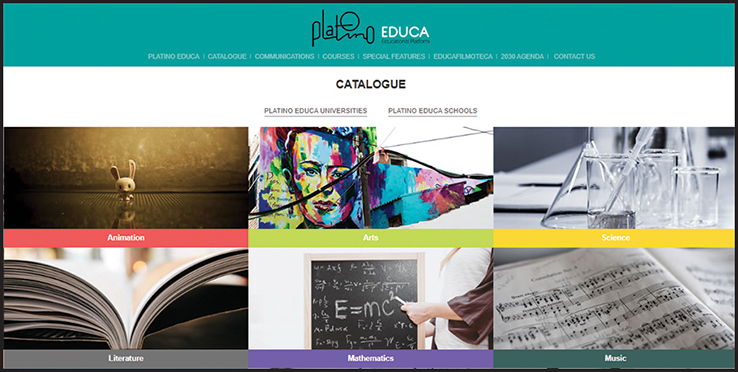Platino Educa | eReview
Designed by and for higher-education teachers in Spain, Latin America, and the U.S., Platino Educa delivers access to hundreds of hard-to-find Spanish-language and Portuguese-language films.
Platino Educa
CONTENT Designed by and for teachers in Spain and Latin America and now expanded into the U.S. higher-education market, Platino Educa delivers unlimited streaming access to Spanish- and Portuguese-language films for teaching and learning. The site hosts over 330 movies, mostly feature films but shorts and documentaries as well. Content addresses current issues such as social justice and the environment. Many of these films are otherwise unavailable to stream in the United States; others are simply hard to find, even on DVD. PDF teaching guides supplement the films with learning objectives, discussion prompts, filmmaker profiles, readings, worksheets, and more.
Viewers can browse two distinct views of Platino Educa, one for colleges and universities and one for K–12 schools. In the higher-education view, films display visually by theme, including animation, the arts, audiovisual literacy, critical thinking, history, language learning, literature, mathematics, music, politics, science, sociology, technology, and United Nations Sustainable Development Goals. The thematic view for K–12 schools suggests age ranges for each film.
Audiovisual Producers’ Rights Management Association (a nonprofit representing 7,000 Spanish and Latin American film producers) developed Platino Educa in partnership with Ibero-American Federation of Cinematographic & Audiovisual Producers.
USABILITY Platino Educa lacks the slick sophistication of commercial streaming platforms such as Alexander Street and Kanopy, but its user interface is sufficiently functional and user-friendly. The platform features a responsive design, so students can use their mobile devices to navigate and watch movies. Students can toggle the platform between Spanish and English versions, though some elements are available only in Spanish, and English translations are sometimes awkwardly phrased. Some films have no subtitles or closed captions; others provide only Spanish subtitles.
The easiest way to explore Platino Educa is to browse titles alphabetically or use the “graphic search” to browse by theme. One can also conduct keyword searches and filter search results by age rating, theme, genre, country, language, date range, production type, and availability of teaching guides or subtitles. Users trigger a new search each time they select a filter, so advanced searching can be time-consuming and frustrating.
Metadata is comprehensive, if uneven. Each film has its own web page with an embedded viewer and essential metadata (date, director, duration, age rating, genre, country of origin, cast, producers, synopsis). Galleries of stills and clips accompany many films. Tags like “war” or “equality” link to dynamic lists of all films tagged with those terms, though the tagging taxonomy is unclear.
PRICING Platino Educa uses a pay-per-view model combined with base pricing tiered according to enrollment. Colleges subscribe for a base platform fee of $300–$800 and pay an additional $3.20 per view after exceeding the number of views (94–250 views) included in the base fee. Unlimited views are allowed once subscribers reach a maximum fee of $250–$1,550 for the first year of a subscription, enabling libraries to control costs without terminating access.
VERDICT Platino Educa overcomes its platform limitations to deliver access to hundreds of hard-to-find Spanish-language and Portuguese-language films. Recommended for colleges and universities that offer majors or advanced study programs in Spanish or Ibero-American history, cinema, and culture.
RELATED
ALREADY A SUBSCRIBER? LOG IN
We are currently offering this content for free. Sign up now to activate your personal profile, where you can save articles for future viewing










Add Comment :-
Comment Policy:
Comment should not be empty !!!